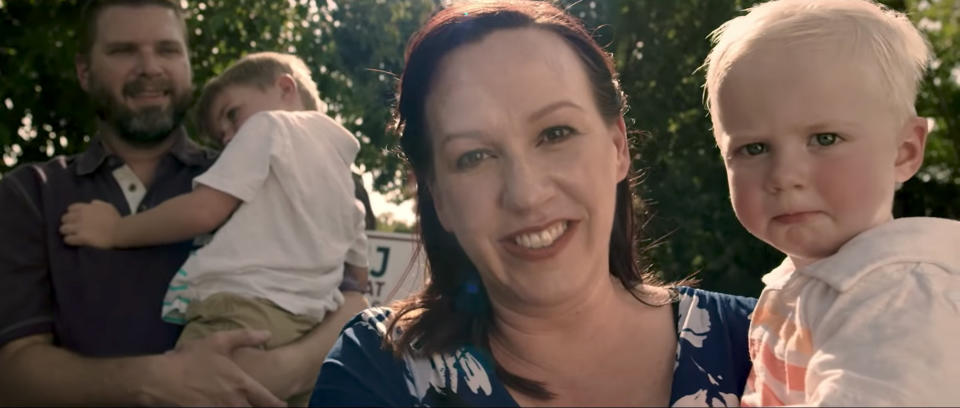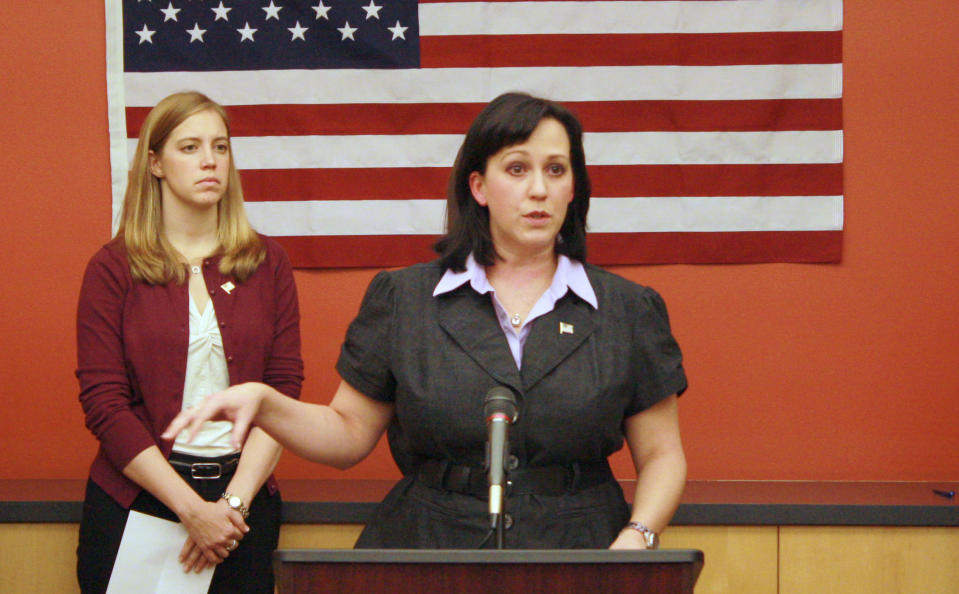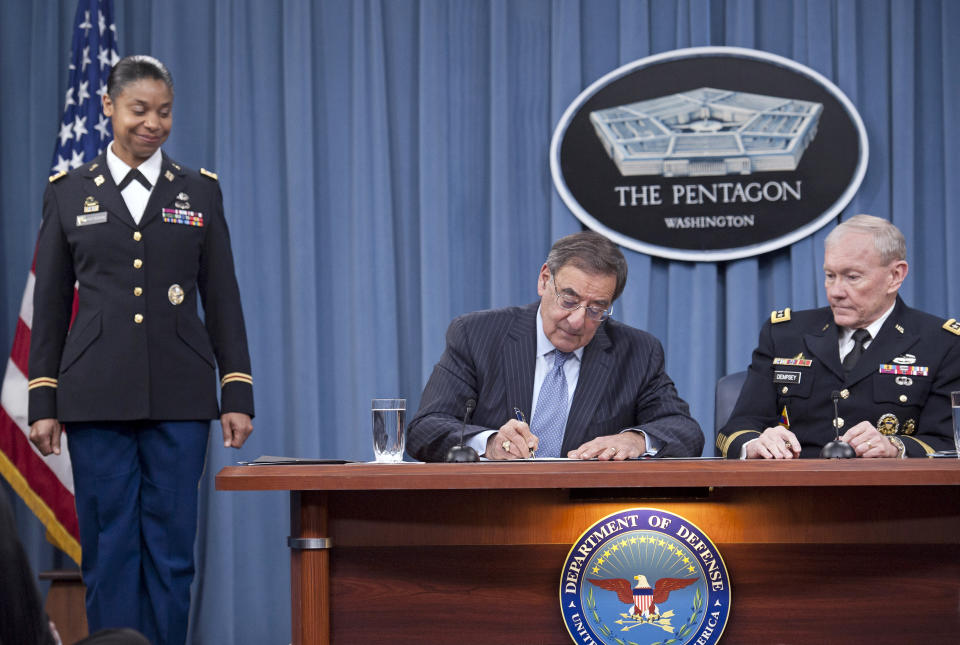Democrat's viral campaign video could be trouble for tea party Republican in deep-red Texas
An Air Force veteran’s biographical and cinematic campaign ad has gone viral — receiving nearly 2 million viewers in just five days — and could give the Democrat a chance in the heavily Republican 31st Congressional District of Texas.
The stylishly cinematic ad, titled “Doors,” tells the story of how Mary Jennings “MJ” Hegar of Leander/Cedar Park went from a girl with dreams of flying airplanes to running for Congress. She served as a rescue helicopter pilot on three tours of Afghanistan, where she was shot down and sustained injuries — earning a Purple Heart. Upon returning, she successfully lobbied to lift a ban on women in all ground combat jobs but encountered many unresponsive congressmen along the way. Now she’s challenging one who she says wouldn’t meet with her, tea party Republican John Carter, who hasn’t had a difficult race yet in their heavily Republican district.
“Apparently, being his constituent and a veteran wasn’t enough to get a meeting. I guess I also needed to be a donor,” she says in the ad. “So now I’m running against him, taking on a system that cares more for campaign donors and political parties than protecting our country.”
Reached for comment, Carter’s campaign called Hegar’s claims about him “absolutely untrue.”
Carter was elected in 2003 after a close Republican primary and an uncompetitive general election. He’s been reelected without any significant threat from Democratic opponents — perhaps until now.
A survey from Public Policy Polling in November found that only 35 percent of the district’s constituents want him back and 57 percent think it’s time for someone new, but he still wins 46 to 40 against a generic Democrat — only six points. When respondents were asked about a Democratic veteran, that candidate was favored by two points, 46 to 44.
Yahoo News reached out to Hegar to learn more about how the video came to be. Below is our edited exchange.
Yahoo News: Are you surprised with the level of attention your campaign ad has received so far?
Hegar: I got to say yes and no. I’m always surprised when people show interest in my bio because I saw hundreds of people doing the same stuff that I was doing, but I’m not surprised that the message of absent representation [that congressmen are less interested in representing their constituents than advancing their careers] is resonating with people. I think that most people feel that way.

Now that the video is live, have you had people reaching out to you saying that their representatives didn’t think they were important enough because they weren’t a donor, or something else along those lines?
I think there is this sense of “you’re not important” or that you can only get to the front of the line if you’re a high-dollar donor. I had one person say to me once, “Don’t forget me when you go to D.C.” I said, “Wait, let me be clear. Your donation says to me that you agree that we share values and that you think I’ll be effective in fighting for us.” If that’s what you mean, then I’ll be fighting for us in D.C. I think we need more of that. We need more people who are not willing to promise people the moon just to get their money.
This video depicts the sexism you encountered when you came back. The door was closed in your face and you couldn’t talk to your representative because you weren’t a large donor. What would you like to do to make sure other women, and people in general, don’t get the same treatment you did?
I really believe in my heart that people in general — whether that’s different ethnicities, religions, genders, backgrounds, accents, socioeconomic statuses or anything — really need a government that’s more reflective of our population. And until we have that, we will have representatives, a majority of whom are representing their own self-interests and the future of their careers. We’ve got to hire more servant leaders. I think that’s a great thing about the wave of veterans running. Veterans understand what it means to put the good of the country ahead of their lives. I don’t think we’ll see a lot of this improve until we have people in office who frankly don’t need to get reelected for their ego or résumé. They just are serving their time as long as their constituents want to put them there. Now, unfortunately, the system is set up to put up barriers [in front of] everyday people who want to run for office. That’s something I’m working on trying to tear down here in my district. I’m trying to support good people up and down the ballot.

If you’re elected, when you get to Congress, what main goals do you have in mind? What problems do you see in D.C. wherein you can serve as a corrective and set things straight?
I have a very realistic view of what a freshman congresswoman can get done. I’ve been mentoring with members and been in D.C. lobbying to stop bad legislation in the past, successfully. It’s really more about what I can do at home. Now, I do have things I want to accomplish in D.C., but the No. 1 priority is constituent services and making sure that the district I’ve grown up in and love has representation and has a way for constituents to communicate and get help when they need help navigating the bureaucracy in government. And advocating. I find it personally offensive when representatives say they know how to advocate for groups without going to those groups and saying, “What are your experiences? What things worked? What things haven’t worked? What are the obstacles you had to overcome? What can we do to make things better and collaborate?” I definitely want to fight for marginalized communities, fight money in politics, fight toxic hyperpartisanship. Those are my three big things.
You’re running in a very deep red district. It’s been Republican for a while. What gives you confidence that this seat can turn blue?
Probably the same thing that has moved our race from “strong red” to “likely red” in a couple of polls. I have lived here almost my whole life. I know this district. This is not your typical red district. Most people here don’t like to self-identify as one party or another. There’s a lot of disenfranchisement on Democratic votes in Texas. A lot of “Oh, this is a red state. If you’re a Democrat your vote doesn’t count” — not to mention voter suppression of different minorities and other groups that tend to vote more heavily Democratic. I would say that the majority of people in this district don’t like to say, “I’m a member of this party or that party.” They’re discerning. They like to vote for the person: someone with character and integrity who will represent them. We have more veterans in this district than in 97 percent of the rest of the country. There is no longer a party of the military. Maybe 20 to 30 years ago, Republicans were the party of the military. I don’t think that’s true anymore in the information age. I think that the reason I’m confident we can win is my district is hungry for representation. While there have been other good people on the ballot against John Carter, those people haven’t been able to gather the type of resources it takes to communicate to voters that they are good people and will represent them. We’re presented with a real opportunity here, and I know we can win.
I’ve taken on uphill battles before. Becoming a pilot was no easy feat, 150 enemy fighters to our nine, suing the secretary of defense: all of those things were done intentionally, after I looked at the data, saw the path to victory and did what it took to win. This will just be my fourth.

When did you decide to take a jump into politics? I know that your goal as a little girl was to become an aviator, and you saw that through. Is it surprising to you that you’re now a politician?
Oh, yeah, very much so. I feel I have the exact opposite personality type than you’d think would run for office. I’m actually quite introverted, a personal and private person. I’m a truth sayer, which I did not think would be a good thing in politics. I’m blunt and don’t mince words. But more and more those are things people are looking for in leadership. When I decided was 2017. My littlest one was about 5 months old, and I was considering running after someone asked me a couple weeks earlier. He woke up in the middle of the night crying. He didn’t want a bottle and he wasn’t wet. I was trying to figure out what was going on. I was bouncing with him and singing to him. He was clearly scared of something, like he had his first nightmare or heard a noise. And I started saying things like, “It’s OK, honey. Mommy’s here. I’m going to keep you safe. I’m going to take care of you.” It dawned on me that if I meant those things, short of wrapping him in bubble tape and not ever letting him leave the house, I needed to go out and do what I could in the world to make it safe, healthy and happy for my children. I want them to be able to love whoever they choose, practice whatever religion they choose if they choose, travel, breathe air, drink the water and grow up with the American Dream the way that I did.
In your campaign ad, you are shown as a kid playing with your airplane toys and you had plane posters on the wall. What was it that captured your imagination about flying and aircraft?
Han Solo in the Millennium Falcon navigating the asteroid field is 100 percent it. The little girl playing with toys, if you watch closely, she’s playing with an X-Wing and a Star Destroyer from “Star Wars” [laughs]. And she has the Millennium Falcon in her lap.

When you first became a pilot, you were involved in putting out wildfires in California and then went overseas for combat. How did service in the military prepare you for representing the people of Texas in Congress? What sorts of lessons did you get from your time in the Air Force?
First of all, I think it’s important we elect people who can admit and understand there are some things worth fighting for. But I think it’s also important that the people making the decision to put our men and women in harm’s way do fully understand the cost of war — not intellectually, but have experienced it and seen it. I think that’s critical. In the military, you’re thrown from wherever you grew up into a melting pot of cultures and people and diversity of thought, color of skin and religion. You’re expected to find common ground, work together and put the mission first. Put. The mission. First. Recognize who the enemy is. The enemy is not someone on your team who disagrees with you on how to execute the mission. We’re in the briefing room all the time talking about strategy, disagreeing — sometimes heatedly — and then we go out and execute the mission. I think it’s no coincidence we have a record low number of veterans in office right now and a record high level of toxic hyperpartisanship.
Could you say a little more about this hyperpartisanship? Do you have hopes it can get better?
I see it on both sides. It disgusts me to hear people want to tear down some of the progress we made during the Obama administration, specifically to undo the man’s legacy. And then I’m also seeing people say things like “I hope North Korea doesn’t denuclearize because that would be a big victory for Donald Trump.” Both of those things equally offend me. We need to talk about what’s right for the country and accept it if it was somebody else’s idea. Just, “You know what, it wasn’t something that came out of my party, but it was good for the country.” Don’t gut and disable things just in the hopes that they’ll fail because you’re scoring some political points on a high school football scoreboard. This issue really fires me up. I’m sorry. I’m so sick of people putting their careers, résumés and parties ahead of this country and its people. That’s what I’m going to go fight.
_____
Read more from Yahoo News:
Stephen Miller, meet your great-grandfather, who flunked his naturalization test
From the ‘Northern Triangle’ to the Rio Grande: Violence, poverty and disasters drive migration
The dominance game, as played by dictators and other animals
With DACA phasing out, college graduates face an uncertain future
Photos: Patrolling the border, where immigrants wait to be caught


